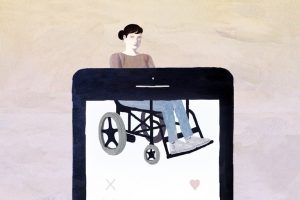Emily Ladau is a disability-rights activist, writer and speaker. Her work has appeared in The Huffington Post and The Daily Beast, as well as the New York Times, which recently featured her experience navigating the frontier of online dating.
 The first time I forayed into online dating, I let my wheelchair show just a little in my photos. The good guys, I hoped, would be so taken by my clever profile and witty banter that they’d be able to look beyond my disability, if they even noticed it at all.
The first time I forayed into online dating, I let my wheelchair show just a little in my photos. The good guys, I hoped, would be so taken by my clever profile and witty banter that they’d be able to look beyond my disability, if they even noticed it at all.
I eagerly began swiping, quickly matching with an attractive man whose profile picture showed him sporting an enormous iguana on his shoulder. Thinking that would make for an easy conversation starter, I messaged him. A few minutes later, he replied, but instead of responding to my reptilian inquiry, he asked, “Are you in a wheelchair?”
I kept my answer simple and told him that yes, I do use a wheelchair, but I was much more interested in the back story of the iguana. Unfortunately, he wasn’t interested at all, messaging back only to say: “Sorry. The wheelchair’s a deal-breaker for me.”
His blunt reply stung, but the feeling was nothing new. Because I was born with my disability — Larsen syndrome, a genetic joint and muscle disorder — I’d already gathered a pile of romantic rejections seemingly big enough to fill an Olympic swimming pool by the time I downloaded Tinder. This particular rejection, however, unleashed a wave of panic within me.
A few months before my initial swipes, I’d gone through a messy breakup with a man I dated for over two years. I truly believed he was the person I’d marry, and that I’d never have to worry about rejection again. When I found myself newly single, I turned to online dating in the hopes of easing my fears that no one else would ever accept me as I am, that lightning doesn’t strike twice.
Not one to be deterred, I persevered, downloading every possible dating app and creating accounts on various dating sites. But I became skittish about revealing my disability, because in an already shallow dating culture, I believed my wheelchair would cause most men to write me off without a second thought. So I decided to hide my disability completely. I cropped my wheelchair out of my photos. I eliminated any mention of it in my profiles. In this virtual world, I could pretend my disability didn’t exist.
I kept up with this facade for a while, messaging matches who were none the wiser. Once I thought I’d spoken with a guy long enough to establish his interest, I’d choose a moment to strike, telling him about my disability. I’d send a long-winded explanation divulging my wheelchair use, reminding him that it didn’t make me any less of person and ending with reassurance that he could ask me questions, should he have any.
After dropping the “wheelchair bomb,” I’d have to brace myself for their reactions, which were always a mixed bag, often ranging from indifference to ghosting. Occasionally, I’d receive an accepting response.
One man that I connected with on Coffee Meets Bagel was incredibly apologetic when I first told him about my wheelchair, as though it was the most tragic thing he’d ever heard. I shut that down by explaining that my disability is part of who I am and it’s nothing to be sorry for. I ended up going on one date with him, and then another. For the second date, my bagel suggested a painting night (a social event that involves paintbrushes, canvases, acrylics and, usually, wine) since I’d told him how much I enjoy them. He found a Groupon and I researched a location, picking out a restaurant in New York City that was supposed to be wheelchair accessible.
As it turned out, the restaurant was accessible, but the painting class was happening in a room upstairs. So, we spent our entire date sitting directly below the painters, eating dinner and making strained conversation with wine-fueled laughter and painting instruction in the background. I was mortified. Following that disaster, I promised my date I’d get his money back. As soon as the company refunded our tickets, I never heard from him again.
It was painful to realize that the hard part isn’t over once someone learns that I’m disabled. Going on dates with me can be a crash course on disability, and I recognize that’s not always easy for non-disabled people to process. But I wasn’t helping the situation by keeping the existence of my disability concealed, springing it upon people only when I thought it felt right. In retrospect, this served only to contribute to the stigma I usually work so hard to fight.
I felt like a hypocrite. In every other area of my life, my disability is front and center. I write and speak endlessly about being a proud, unapologetic disabled woman. It is part of my identity, shaping everything I do and everything I value. But in the online dating world, my disability was my secret shame.
So I decided it was time for a change. I started gradually, making references to my disability throughout my profile, then adding photos in which my wheelchair is clearly visible. I tried to keep things light and humorous. For instance, OKCupid asks users to list six things they can’t live without; one of mine is “the invention of the wheel.”
Still, I found myself having to make sure that potential matches had actually picked up on the trail of clues I’d left. I grew tired of feeling like I needed to deceive men into being interested because society instilled in me that my disability makes me undesirable. Finally, I took the leap I’d been so afraid to make, opening up about disability to strangers whom I hoped would appreciate my honesty and perhaps send me a message.
Prominently in my profile, I wrote: “I’d like to be very upfront about the fact that I use a wheelchair. My disability is part of my identity and I’m a loud, proud disability rights activist, but there is so much more that defines me (you know, like the stuff I’ve got in my profile). I realize some people are hesitant to date a human who experiences the world sitting down. But I’d like to think you’ll keep reading and dive a little deeper. And you’re welcome to ask questions, should you have any.”
Once I added that paragraph, I felt liberated, relieved that anyone I spoke to would have a clearer picture of me. There have been plenty of matches that haven’t worked out, and whether that’s actually because of my disability, I’ll never know. But I had a nearly yearlong relationship with a man I met through OKCupid, so I know it’s possible for lightning to strike again. My dating life remains a comedy of errors, and I still struggle every day with the feeling that my disability means I won’t find love, but at least I’m being true to myself. I’m putting myself out there — my whole self — and it feels good to be proud of who I am.

I am a female. I, like you, had trouble in the disabled dating world. Or should I say have. I am a paraplegic from am auto accident 17 years ago. In the beginning of the online dating I to would hide my disability until I got to know rhem better and they asked for a date. I luckily have only had a handful of men reject me because of my wheelchair. I have had several long term relationships and one failed marriage in 17 years. I decided to put my situation in my profile about 12 years ago. I have had positive feedback since doung that. I got out of a mentally and verbally abusive relationship about a year ago and had been scared to try again. I wasn’t really looking for a relationship at the time my current boyfriend sent me a message wanting to know more about me. He said I inspired him. We have been hav8ng a great time getting to know each orhwr the last 3 1/2 months. So don’t give up!! You never know who might love you because of your attitude and strength dealing wirh your disability!